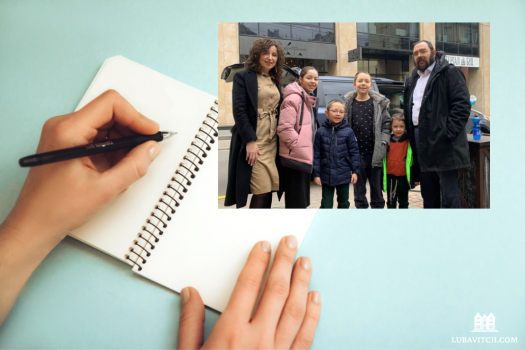
War Diary: Mrs. Chani Gopin – Shlucha to Ukraine
2:00AM 2/27 – Motzei Shabbos, Parshas Vayakhel, 5782
I can’t sleep. I don’t know why. Really I could be sleeping; the entire neighborhood is silent.
The room is silent, and everyone is asleep. The past few days were draining for the kids. I won’t lie. We are also at wit’s end. Tears stream down my husband Shalom’s face, and I start crying with him. Ukraine is running to bomb shelters. Millions of people are living in unbearable suspense and anxiety. I was never a political person, but recently it’s hard not to be angry.
We spent the entire day talking to our community. There are families with young children and elderly adults who’ve seen their 80th birthday – they can’t run to the bomb shelters. When the sirens go off, they try to find a safe place in their home and hope. My daughter Leah told me, “I’ve matured more in these days than I have in many years,” and it made me cry again.
As the clock slowly ticks by and the hours pass, I think about people. Eitan, a close friend and part of our community, left Kyiv on Friday morning. He took his wife and his son Dovid, just nine months old, and headed somewhere in the direction of Poland. He knew it would be hard to get there, but he didn’t know how hard.
We spoke to him after Shabbos. He was still on the road. He had crossed the border and was on his way to Krakow. We talked to the Chabad Shliach in Krakow, and by now, he was waiting for Eitan with hot food and a place to spend the night. I wonder how little Dovid is doing, what trauma was all this is etching into his soul. None, I hope.
The thought harasses me again and again — how could this happen?
We are ok, Boruch Hashem. Just about ok.
I don’t know how we got this far. I think of how Shalom behaved, how hard the anxiety was on him. These past weeks he hasn’t been himself. It’s been impossible not to notice. He says he lost weight, and it looks like he’s right. That’s what happens when uncertainty gnaws at you for days and weeks. It’s already happened to us once before. My stomach turns over, just thinking that it might happen again. We’ve only just moved our furniture from Luhansk to Kyiv, and for the first time in a long time, we’d begun to feel at home again.
I was determined to hold myself together, and I don’t know how I did it. Maybe it’s because I built a defense mechanism after leaving Luhansk. I was protecting myself not from missiles but from the uncertainties of life. Inside, my soul decided never to get too attached to a place. I was afraid fate might snatch it away.
The buildup to the war was hard for me, and I too cried, but I managed to feel in control, Boruch Hashem. G-d knows better than us. Leaving Luhansk in 2014 was incredibly tough for us. But thank G-d we rebuilt anew. With my hand on my heart, we grew in every way. We don’t yearn nostalgically for Luhansk, and we don’t want to go back anymore.
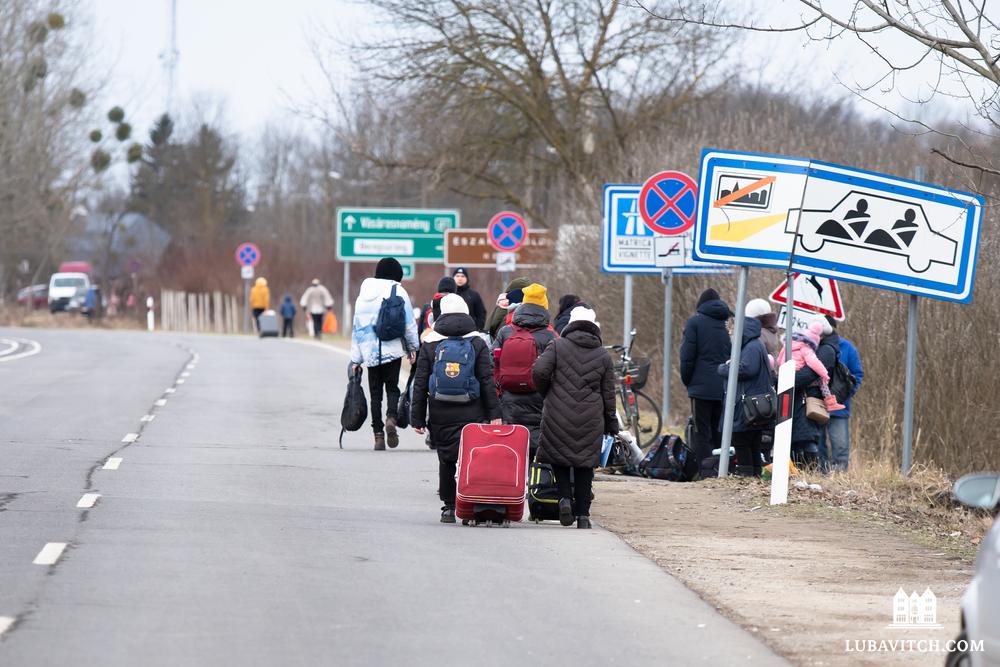
What we are doing in Kyiv is better, and we’re accomplishing things.
Everything is good in Kyiv, Boruch Hashem… or at least it was until last Thursday morning. But G-d will not abandon us.
Why does this frighten me so much? Am I scared of being in freefall for a while? That I will never be able to return home? That once again, we will have to recalculate our path in life. I believe that we will one day return home to Kyiv to continue our work with the community we love so much. The connections and friendships that we gently wove together with love. When will that be? Only G-d knows. I just want to hope that it will be soon.
When we drove out of Kyiv, I couldn’t think. We were nervously scanning for any sign of danger and were on hyper-alert the entire time. Cars jammed the highways for miles. We crawled along or just plain parked in traffic for hours. I don’t know how Shalom did it; I would have lost my mind. Just sitting there, the stress just grew, and we were soon totally exhausted. We tried to get ahead a few times. Shalom took detours over dirt roads, and sometimes he’d drive on the wrong side of the road. My heart stopped.
When you sit in traffic for hours on end, you start to wonder if you’re moving. There’s no way to tell. I just wished I could close my eyes and relax for five minutes. I thought I’d feel refreshed then. But when I opened my eyes again, I was back in the nightmare.
We arrived in Khmelnytskyi late at night and fell asleep in our clothes.
Before Shabbos, we need to get to Chernivtsi, near the Romanian border. We planned to leave early in the morning. On Waze, it’s just a three-hour drive, but it was Friday, and we were not taking any risks. At 6:00 am we got up and got ready to leave. After seven, all the kids were in the car, and we were ready to go. I was worried about getting stuck on the road, and the thought of getting stuck in traffic on Shabbos – G-d Forbid!
In the end, the roads were empty. Police checkpoints stopped us every few minutes, but there were no traffic jams, and we drove in peace for a few hours. By some miracle, we even found a gas station that still had gas, and the line wasn’t even so long. For the first time, we started thinking about where we should go. Should we decide to go to Israel? Should we drive the car across the Romanian border? We’ve never let ourselves think that far yet. We hardly believed we’d even get as far as we already did.
On the way, we began to speak about our plans in Chernivtsi. We didn’t leave the inferno to go on vacation. We have a shlichus, and now that we’re out of Kyiv, we have to help from the outside. We spoke to our sweet friend Fraidy, who put together an online form for the Jews of the community. Even before Shabbos, we used it to distribute financial aid to the people still at home. My son Yisrolik innocently shouted from the back seat that he had brought his money with him, and he wanted to donate it to the community. That made us cry. We’re all so emotional right now.
I thought how nice it was to have the kids with us this Shabbos, just when we’re worrying so much. At least we can share our worries and fears, and be there for each other.
My son Yossi sent me a picture of a building that was billowing smoke into the sky. I couldn’t look at the picture. I started crying. He asked me if it was our neighborhood. I wasn’t, but what does it matter. It was Kyiv! Just a day and a half ago, it had been in its full glory, and now, clouds of smoke blotted its skies. Yossi said he was following the news from Israel. When your children are far away, everything is more threatening. Not that I’d want them to go through this madness, they had already been through something very similar a few years ago.
When we arrived in Chernivtsi, we drove to the Kosher restaurant in town. We ate a light but filling breakfast and went to a hotel in the city center. The shluchim here, the Glitzenshtein family, invited us to eat with them on Friday night. We were too exhausted mentally and physically. We could not imagine sitting at a normal Shabbos table when everything was so sad. We stayed at the hotel, in the two rooms we’d booked. Shalom bought some food and whatever else we’d need for Shabbos at a local store, and we had a meal in one of the rooms. Before Shabbos, the wonderful shluchim sent us food as well.
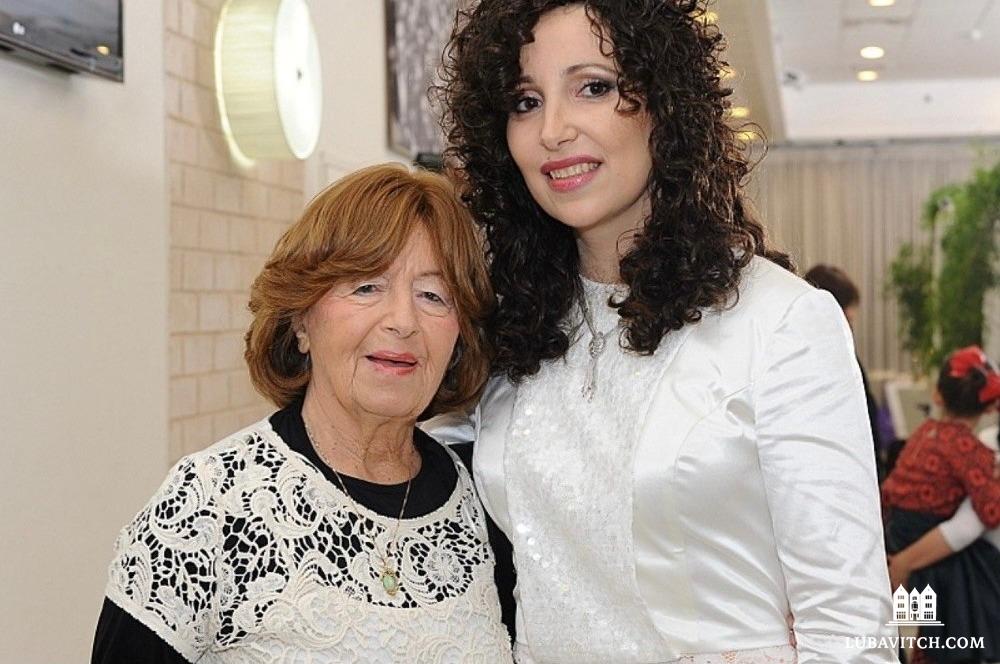
A Shabbos Meal In Wartime
Friday night Shalom was exhausted in every way. He didn’t have the strength to walk across town to the Chabad House, but he took the kids on a walk. They got fresh air and met a few Jews. The city was going about its business as usual. It was like we were in a different country. I guess that’s how the world works; until the danger comes for you, you don’t worry about it.
As my husband started to sing “Shalom Aleichem,” our son Yeshayahu told him that he wanted to talk privately in the hallway. There he began to cry.
“Abba, it’s so sad that we’re eating the Shabbos meal all alone in this hotel room. Last Shabbos at home awe had so many guests, and it was so happy.”
My husband hugged him and promised him we’d try to be happy. So that’s what we did. We tried not to mention the war, but even our youngest, Zev, was upset about it. We tried to sing niggunim and speak about positive things.
The kids woke up, said Tehillim, and walked to Shul in the morning. We ate with the Glitzensteins after davening, and they were generous hosts. It was strange for me. I love to host, and it felt weird to be the guest for once. We had a lovely meal with several other refugees from Kyiv and other eastern cities. While we were eating, someone knocked on the door. A family from Dnipro who had just arrived in town had gotten Chabad’s address. It looks like the Shluchim here have a big job ahead of them.
After Shabbos, Shalom met with Rabbi Glitzenshtein, and they discussed how to shelter the Jewish refugees. Just tonight, fifteen more people came in from Kyiv, and Shalom was worried about what they would eat and where they would sleep. They say that when the going gets hard, you should help someone else, so we decided to help.
That’s it. All this writing has tired me out. Maybe now I’ll be able to fall asleep, and maybe there will be good news in the morning.
2/27 – Sunday Morning
Good Morning Romania. I checked my phone to see what day it is today, the hours and days have come and gone and I’ve barely noticed.
Last night at midnight, I spoke to Fraidy. I had to get in touch. I know that the kids are worrying. They also see videos and pictures and wonder what will happen, so let’s at least talk. After midnight is my time, I was always a night owl, and since my kids were born, I’ve always waited for the night hours. Then I can have my quiet and reconnect with myself. Thinking of quiet always reminds me of Luhansk. My happy place in Luhansk was when I’d sit in the kitchen that I loved so much, and I’d write until the wee hours of the morning. The darkness outside, and the soft light inside, somehow, it’s good for me.
But last night was different. I spoke to Fraidy, but my eyes were sad, and I might have fallen asleep while talking to her.
I woke up this morning struggling to figure out where I was and if the bedding had been washed or not. I wondered why everyone had fallen asleep in their clothes again. I guess that’s what they mean when they call us refugees, that we can’t fall asleep properly. I am not very alert, but I’m also not afraid anymore. So when the air raid sirens came to Chernivtsi on Sunday night, I didn’t feel fear anymore. I was numb with exhaustion.
On Sunday, we thought we’d stay for a few days. The city was quiet and relaxed, so far from Kyiv, we should be safe. But Shalom began noticing little signs that made him uneasy. After the sirens blared for the entire night, we went out for fresh air, and there wasn’t a living soul in the streets. This is how it began in Luhansk, bit by bit, hint after hint until suddenly the tsunami comes.
We went to sleep, still undecided on the issue of leaving Ukraine. We had already left our home behind, with no idea when we’d return. So why don’t we leave Ukraine altogether and be safe? But it still meant something to be in the same country, hear the same language spoken in the streets, and feel like we are here with everybody. Maybe we’re deluding ourselves with the hope that we might still return home. Or at least we can be together with our friends who stayed in the country. Being in Ukraine makes us feel connected to our community, even if we could give the same moral support on the other side of the border.
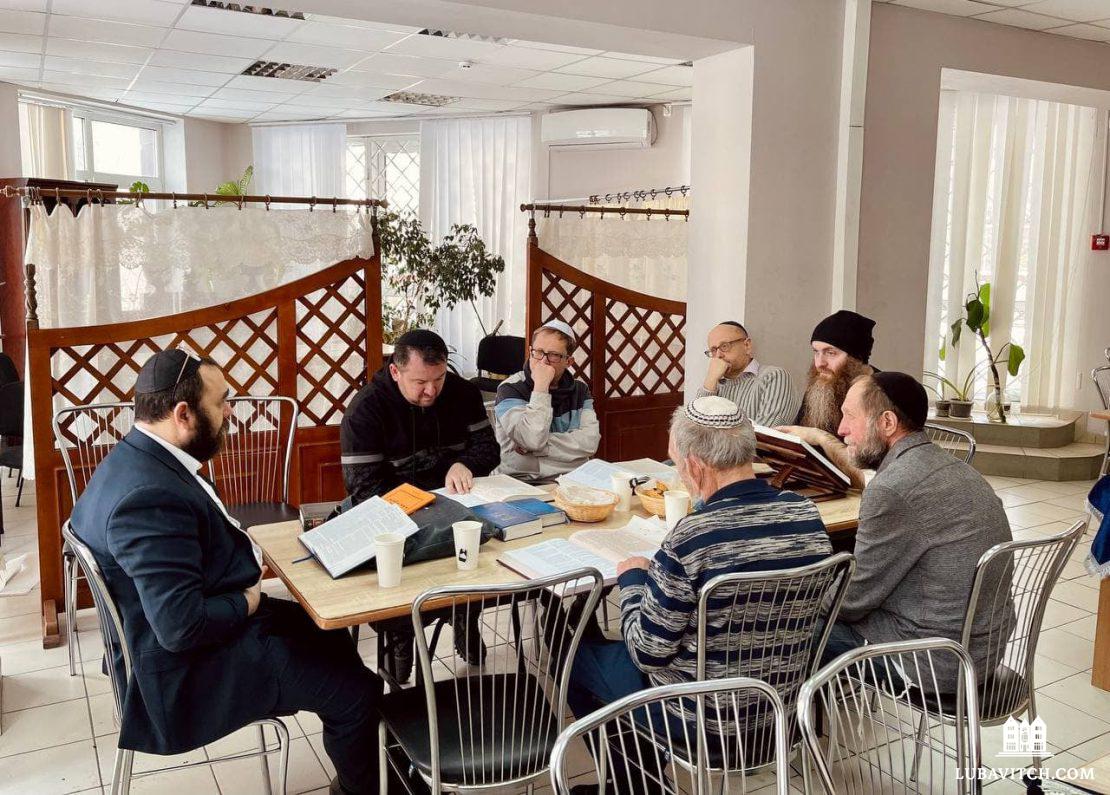
We went to sleep unsure but woke up with a clear decision. We’re going. We didn’t decide; the air raid siren did. After midnight we heard its screams, and I have not slept since then. I tried to work on my computer last night, and started checking off a week’s worth of tasks. Shalom fell asleep, as did the kids. Suddenly I jumped. I hadn’t expected to hear the air raid alarm here. We grabbed the kids and ran down four flights of stairs to the hotel’s spa in the basement. The intense humidity might be pleasant if you’re getting a massage, but try breathing naturally in such a place. We looked each other in the eyes, and we knew – we were leaving.
How Good It Is To Have Family
We got up in the morning, organized ourselves, and decided to wear smiles as we left. Luckily, we have a big enough car to fit all of us and our baggage. When we’d packed, I had told Shalom that I was taking a summer wardrobe for us all. When we’d left Luhansk, we’d only taken enough clothes for two or three weeks. I wasn’t going to make that mistake again.
This time I had succeeded in being organized. We’re more experienced now. If we get to Israel, or Africa for that matter, we’ll have sandals. If G-d has mercy and we return to Kyiv, nu, so we schlepped a suitcase for nothing.
We left Chirnivtski, but we don’t know where we’re going. We looked up the border crossing with the shortest line and headed there. It didn’t take long to get there, but hundreds of cars lined up at the crossing, waiting to escape the inferno. I hate to write it, and it’s unethical, but we skipped part of the line. I hope it doesn’t affect our sensitivity and consideration, but that’s what happened. So we only had to wait a few hours.
We entered Moldova, but Waze stopped working. We drove a while without GPS, but pretty soon, we were nervous that we’d accidentally end up back in Ukraine. Someone behind us noticed that we looked lost and motioned to us to stop.
“You’re heading to Romania?” he asked.
Apparently, this man read our thoughts and signaled for us to follow him. A few minutes later, we were waiting in another line, this time on the border between Moldova and Romania.
The Romanians were in no rush. They probably aren’t accustomed to being overloaded. They ran around, checking and asking questions and then checking again. In the car with us was a babushka. We picked her up at the Moldovan border. She’s on her way to Poland, and here she was, sitting in the back of our car, alone and afraid. I thought about it for a moment, and it made me realize I have a family. We have a family—a warm and loving one. We are not alone, and we are here to support each other and give each other strength.
So many people have to go through all this horror alone—my Russian teacher Ola, for example. For two years, she’s helped me brush up my language skills, and now she’s alone. She has one son, but he left Ukraine years ago. When the war began, she escaped Kyiv proper and stayed with some friends in the outskirts. But when the war came closer, she understood that this too was not safe, and she headed west.
I spoke with Ola yesterday. I asked her where she was. “I’m in Poland,” she said, “I’ll travel to Germany and from there to Israel.” Poland? How did she get there? When she got to the border, the line was so long that she decided to walk. She walked 7 kilometers to the Polish border while carrying her bags herself. She crossed the border and squeezed onto a crowded train, all alone. How good it is to have a family. How good it is to have during war, and how sweet it is to build with love during peace.
Wikipedia & Connections
We passed the Romanian border too. The kids are getting hungry. We hadn’t wanted to stop until we completed the most critical task of the day. On the other side of the border, we are greeted by dozens of stands handing out supplies for the refugees. Relief organizations were handing out food, water, and medical supplies. It was all so bizarre I pinched myself. Is this all real? It’s like a scene from the First World War or the Second. Maybe this, G-d forbid, is the Third.
We’re searching for a gas station. Back in Ukraine, there is a gas station every two kilometers or so. But here, no gas. The gas tank isn’t going to fill itself. I tried to ask some fellow travelers, fishing around with the few words of Romanian that I know.
Why do I know any Romanian at all? I was here thirty-eight years ago. When I was six years old, I came with my parents to visit my grandpa and grandma: Rabbi Yisroel Tzvi and Tzippora Heber, of blessed memory. The Rebbe sent them to Romania, and I wondered if maybe my grandpa had traveled down these same roads on his way to certify kosher meat for the Jews of Romania. When I visited, I learned how to count in Romanian and a few other words. Now, let’s see how far my knowledge gets me.
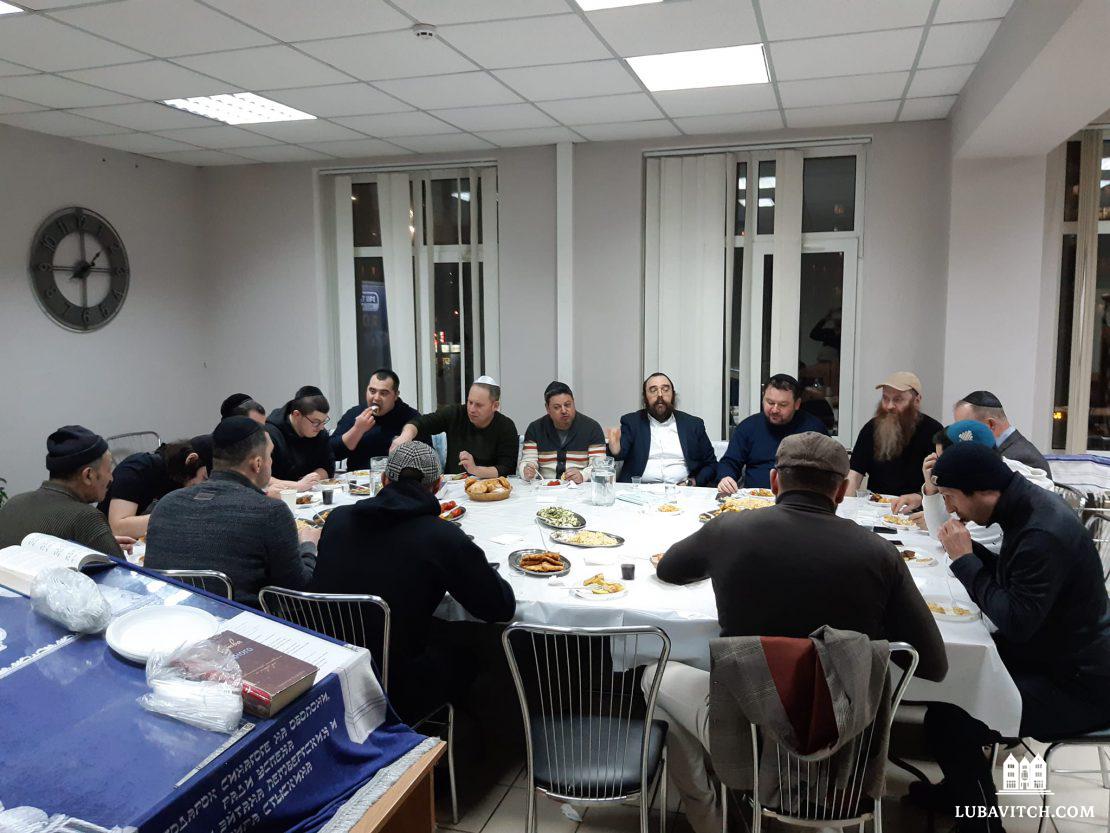
Where are we going? Maybe to Bucharest. They have kosher food there. We can’t keep living on bananas and apples, especially because we have children with us. But it’s an eight-hour drive to Bucharest, and what are we going to do when we get there? Maybe we’ll go to Israel, the land that I love infinitely. Whenever I’m in Israel, I feel a certain peace inside, like I came to where I belong. But now it is different. I don’t want to go to Israel as a refugee; I want to go by choice.
In the meantime, I’m here, in Romania. How long? Maybe a day, perhaps a week. We’ll live through today, and then we’ll see. Go with the flow. One of the lessons I learned trying to keep my head above the water was that you should always go with the waves, don’t fight them. Don’t waste vital energy on impossible things. We can’t change the circumstances, only our response. So I’m flowing. Yesterday I was in Ukraine, today in Moldova and Romania. Tomorrow? G-d knows.
Shalom suggested we should go to Iași. Iași? What’s Iași? I’ve never heard of this place. For the first time, I lost control. I think I regretted just running off with no plan and no idea where we were going. Maybe we made a mistake. I calmed down and read Iași’s Wikipedia page. It makes sense, actually. It’s close to Bucharest, is about a two-hour drive away, and has an international airport.
Ok, so let’s go to Iași, whatever.
But, where are we going to stay, and even more importantly, what will we eat? Shalom doesn’t lose his cool; he makes phone calls. Lots of phone calls to lots of people. I don’t even know who he’s calling. They say if you know a guy and he knows a guy, you have to make six calls before reaching the person you need. Eventually, Shalom got the information we needed, and we had a place to stay.
It turned out that some Jewish organization has a guest house in Iași for groups of tourists who come to visit the graves of Tzaddikim. During the summer it’s usually active, but now it’s closed. They were happy to help us, and they said they’d leave us the key. We can stay for as long as we need, free of charge.
Maybe there is some kosher food in the freezer there. Doing the math, we realized that the food we brought with us was enough for dinner tonight. Maybe tomorrow we’ll make a trip to Bucharest. I don’t like risks, and I’d like to find a more secure place even if it means we’ll travel a few more hours. But everything is hashgacha pratis.
Dreams Coming True
Fate is laughing at me. My son Yossi texted me that my dream has finally come true. I’ve always wanted to take the family on a road trip through Europe. Well, we’re doing that now. It’s a little different than I’d pictured. I see we can do it anyway, and maybe we can do it during peacetime one day. Yisrolik fell asleep, and when he woke up, he insisted that he didn’t know we’d left Ukraine. At least from the view out his window, he couldn’t tell we’d crossed the border.
When we got to the guest house, we found that they had left us the key. I tried to imagine that we were on vacation. I’ve heard that if you can convince yourself something is true, it feels real. So I tried. But when we opened the door, we were greeted by a cold blast. We had forgotten to ask if the house had heat. Clearly, it didn’t. We wrapped up in our coats and sat on the couch. Shalom called around to see if he could get the heat turned on. He spoke in Russian and English but to no avail. Finally, we reached a professional and drove around in the car to stay warm while he worked.
That’s it then. We have heat, and we even found something to eat.
Monday morning, we discovered that our dear neighbors from Kyiv, a Jewish family, were in town too. We’d heard that they had reached the border, and now they were in Iași looking for food. We invited them for breakfast and sat there, not knowing if we should laugh or cry.
That’s it. I’m going to do something with myself. A long time ago, I read that if the going gets hard, and all you want to do is bury your head under a pillow, it’s better not to run away. You have to face up to it, or the pain will only get worse. So what should I do? Anything. Even routine actions will help me refresh myself and get started again.
If you would like to donate to Chabad’s relief efforts in Ukraine please click here.










